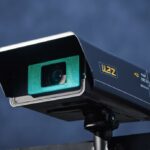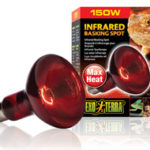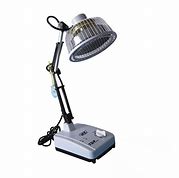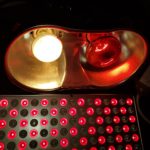Last Updated on 4 months by Francis
The legality of infrared license plate blockers in the United States is a topic of interest and importance for many drivers. These devices, which are designed to prevent automatic license plate recognition (ALPR) systems from accurately reading license plate numbers, raise questions about privacy and compliance with state laws. Understanding the legal landscape surrounding infrared license plate blockers is essential for motorists who are concerned about protecting their privacy while staying within the bounds of the law.
Contents
Key Takeaways:
- State laws regarding the legality of infrared license plate blockers vary across the United States.
- While some states allow their use, others prohibit or restrict the use of these devices.
- It is important for drivers to familiarize themselves with the specific license plate cover regulations in their state.
- Alternative countermeasures, such as specialty license plates or Veil Stealth Coating, can provide privacy protection while complying with the law.
- Privacy concerns surrounding ALPR technology and license plate recognition systems are being addressed by organizations like the ACLU.
State Laws on License Plate Visibility
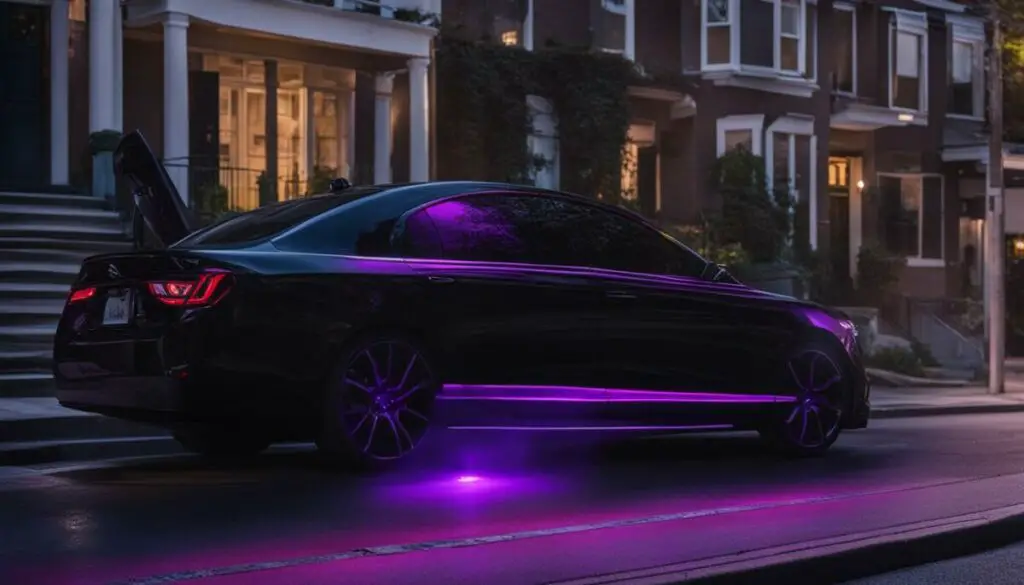
Each state has specific laws and regulations regarding license plate visibility. It is important to familiarize yourself with these regulations to ensure compliance and avoid any legal issues. Here are a few examples of license plate visibility requirements in certain states:
Alabama
In Alabama, the license plate must be visible at all times. The state name should be clearly visible at the top of the plate.
Alaska
In Alaska, the license plate must also be visible at all times. It should not be obstructed by any objects or coverings.
Arizona
In Arizona, the license plate must be clearly legible and visible. The state name should be visible at the top of the plate.
These examples illustrate how license plate visibility laws can vary from state to state. It is essential to comply with the specific regulations in your state to ensure that your license plate is easily readable and visible at all times. Failure to comply with these laws may result in fines or other penalties.
Prohibited License Plate Covers and Shields
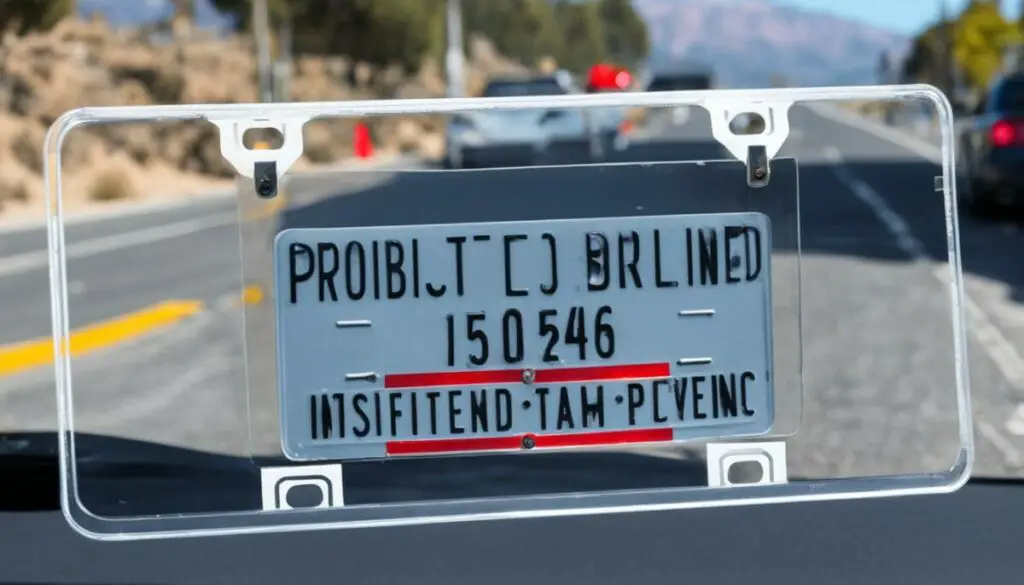
When it comes to license plate accessories, it is important to be aware of the restrictions imposed by different states. Many states have regulations in place that prohibit the use of license plate covers and shields that can hinder the readability of the plate or diminish its reflective properties. These restrictions are put in place to ensure that license plates are easily identifiable by law enforcement, traffic cameras, and other relevant parties.
For example, let’s take a look at two states that have specific restrictions on license plate covers:
Arkansas License Plate Cover Restrictions:
| State | License Plate Cover Regulations |
|---|---|
| Arkansas | Covers that reduce the reflective properties of the license plate are prohibited. |
California License Plate Cover Restrictions:
| State | License Plate Cover Regulations |
|---|---|
| California | License plate covers, including red light and speed camera covers, are not allowed. |
Other states may have similar restrictions in place, and it is important to check the specific regulations in your state to ensure compliance with the law. By avoiding prohibited license plate covers and shields, you can prevent any potential legal issues and ensure that your license plate remains clearly visible.
Remember, the purpose of license plates is to provide clear identification, and obstructing them with unauthorized accessories can lead to fines or penalties. It is always recommended to follow the laws and regulations of your state when it comes to license plate accessories.
Please note that the image above is for illustrative purposes only and may not represent the actual license plate covers and shields that are prohibited.
Red Light and Speed Camera Restrictions
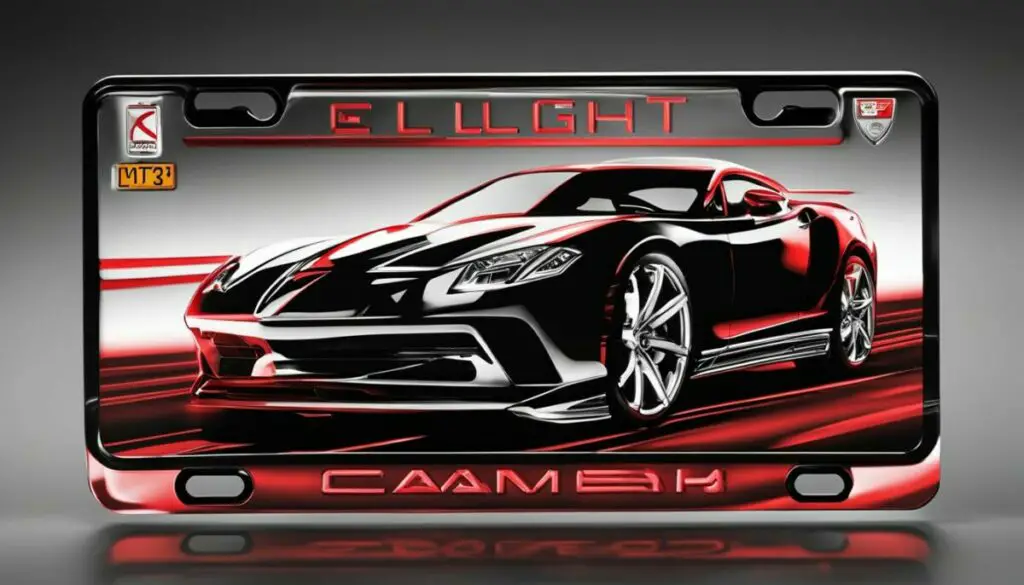
When it comes to red light and speed cameras, several states have implemented specific regulations regarding license plate covers. These regulations are aimed at ensuring the visibility and legibility of license plates for effective enforcement. It is important for drivers to be aware of these restrictions to avoid any legal consequences.
In California, the use of red light camera license plate covers is strictly prohibited. This regulation is in place to prevent any obstruction that might hinder the accurate identification of vehicles violating traffic laws. Similarly, in Delaware, license plate covers, shields, and sprays that obstruct the visibility of license plates are also prohibited. These regulations aim to ensure that license plates are clearly visible in order to accurately capture possible traffic violations.
Understanding and complying with the specific regulations related to red light and speed cameras in your state is crucial. By adhering to these regulations, you can avoid potential legal consequences and ensure the effectiveness of traffic enforcement systems.
| State | Red Light Camera License Plate Cover Regulations |
|---|---|
| California | Prohibited |
| Delaware | Prohibited (including covers, shields, and sprays that obstruct visibility) |
Impairment of License Plate Reading Devices

Many states have laws that prohibit license plate covers and frames that impair the reading of the plate by devices. It is important to ensure that plates are not obstructed in any way that could prevent them from being read by license plate reading devices.
| State | Restrictions on Plate Covers |
|---|---|
| Colorado | Covers that shield or impair the reading of a license plate are not allowed. |
| Indiana | Plates must be free of foreign materials that could impede visibility. |
| Texas | It is illegal to own or display a license plate cover that prevents the reading and identification of the license plate by law enforcement or toll road authorities. |
| New York | License plate covers must be clear and not obstruct or impair the reading of the information on the plate. |
These examples highlight the restrictions imposed by some states regarding license plate covers and frames. It’s important to abide by these regulations to ensure that license plates are visible and readable by license plate reading devices.
Infrared License Plate Blockers and Privacy Concerns
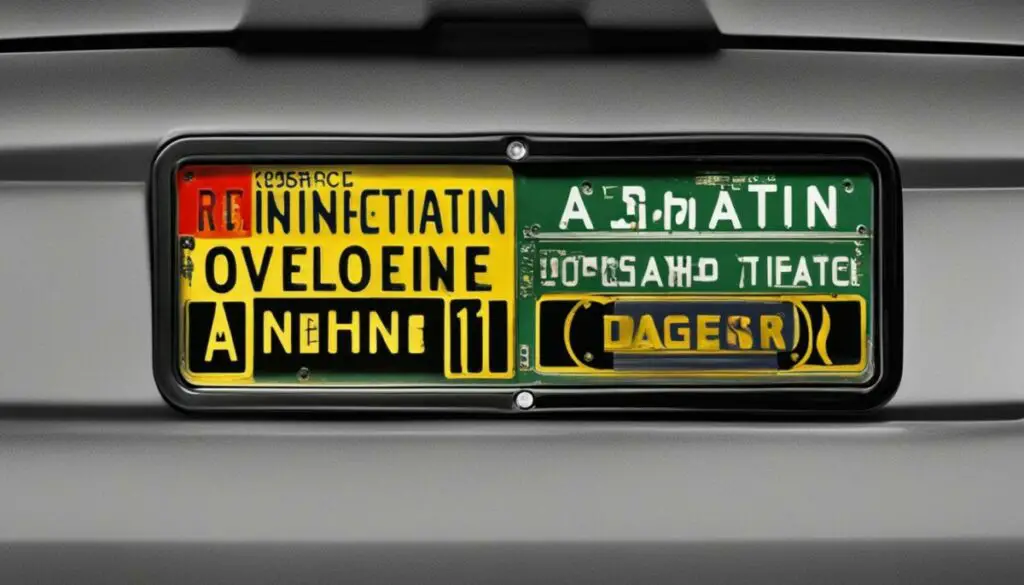
Infrared license plate blockers have become a subject of significant concern due to the privacy implications associated with automatic license plate recognition (ALPR) technology. ALPR systems utilize optical character recognition (OCR) to read license plates and gather data. However, the use of infrared license plate blockers can potentially hinder ALPR systems from accurately capturing and identifying license plates, raising valid concerns regarding privacy invasion.
ALPR technology has gained widespread adoption and is employed by law enforcement agencies and private entities for various purposes, including traffic enforcement, crime prevention, and parking management. While ALPR technology offers undeniable benefits, such as aiding in investigations and enhancing public safety, it has also sparked debates about the appropriate balance between security and privacy.
Privacy concerns arise because ALPR systems are capable of collecting vast amounts of data, including time-stamped vehicle locations, which can be stored and potentially accessed by government agencies or other entities. The use of infrared license plate blockers presents an opportunity for individuals to protect their privacy by making it more challenging for ALPR systems to accurately read and record license plate information.
It is important, however, to recognize the legal implications and potential consequences of using these blockers. While some argue that privacy rights should be protected, others contend that obstructing a license plate for any reason is against the law. As the debate continues, it is crucial for individuals to stay informed about the specific regulations and restrictions in their respective states.
Infrared License Plate Blockers vs. Automatic License Plate Recognition
Automatic license plate recognition technology has revolutionized law enforcement and traffic surveillance. By utilizing a combination of cameras, optical character recognition, and sophisticated algorithms, ALPR systems can scan and process thousands of license plates in a short period, significantly augmenting law enforcement efforts.
However, the use of infrared license plate blockers can potentially disrupt the accurate identification and capture of license plate information. By emitting infrared light that obscures the readability of the plate, these blockers can prevent ALPR systems from performing their intended function.
It is important to note that the legal status of infrared license plate blockers varies by jurisdiction. Some states explicitly prohibit the use of such devices, while others have yet to address their legality. It is crucial to familiarize yourself with the applicable laws and regulations in your state before considering the use of infrared license plate blockers.
Add relevant statement about privacy concerns and potential consequences.
| States | Legal Status of Infrared License Plate Blockers |
|---|---|
| New York | Illegal |
| Texas | Legal |
| California | Illegal |
| Florida | Legal |
| Illinois | Illegal |
The Impact on Privacy
The use of infrared license plate blockers raises valid concerns about the invasion of privacy. ALPR systems can collect data indiscriminately, capturing the movement and whereabouts of vehicles. This ability has sparked debates about the scope and limits of surveillance, with privacy advocates arguing that individuals should have the right to protect their personal information.
While individuals seeking to safeguard their privacy may find infrared license plate blockers appealing, it is vital to be aware of potential legal consequences. Consultation with legal professionals and an understanding of the specific regulations governing license plate modification in your state can help individuals make informed decisions and mitigate any potential legal risks.
In summary, the use of infrared license plate blockers to protect privacy in an era of widespread ALPR technology raises important legal and ethical questions. While it is essential to protect personal privacy, it is equally crucial to remain informed about the existing legal framework and to ensure compliance with applicable laws and regulations.
Countermeasures and Alternatives
While infrared license plate blockers offer a way to protect your privacy from license plate readers, there are also alternative countermeasures available. These countermeasures can help you avoid any legal issues while still safeguarding your personal information.
Specialty License Plates:
If you’re concerned about license plate readers, using specialty license plates with complex backgrounds can make it more challenging for these devices to capture and interpret your plate. These plates often include intricate designs or patterns that can disrupt the readability of the plate and make it harder for automatic recognition systems to accurately identify it.
Brackets:
Another option to consider is incorporating brackets into your license plate setup. These brackets can be strategically placed to partially obstruct the numbers and letters on the plate without completely blocking the visibility. By doing so, you can introduce visual noise that may interfere with license plate readers’ ability to read and interpret your plate correctly.
Veil Stealth Coating:
A popular alternative to infrared license plate blockers is Veil Stealth Coating. This broad-band infrared-absorbing coating can be applied to your license plate, reducing its visibility to infrared license plate scanners. By absorbing the light used by these scanners, Veil Stealth Coating makes it more difficult for them to accurately capture and recognize the numbers and letters on your plate. This innovative solution offers a non-invasive way to protect your privacy while ensuring compliance with the law.
When choosing a countermeasure or alternative to infrared license plate blockers, it is essential to research and understand the specific legal requirements in your state. Some countermeasures may be subject to restrictions or regulations, so it’s crucial to ensure you choose a solution that aligns with the laws in your jurisdiction.
| Countermeasure | Features |
|---|---|
| Specialty License Plates | Complex backgrounds |
| Brackets | Partially obstruct numbers and letters |
| Veil Stealth Coating | Broad-band infrared absorption |
Each countermeasure or alternative has its advantages and may provide varying levels of protection against license plate readers. Consider the effectiveness, legality, and suitability of each option based on your specific needs and the legal requirements in your state.
Legality of License Plate Blocking Devices
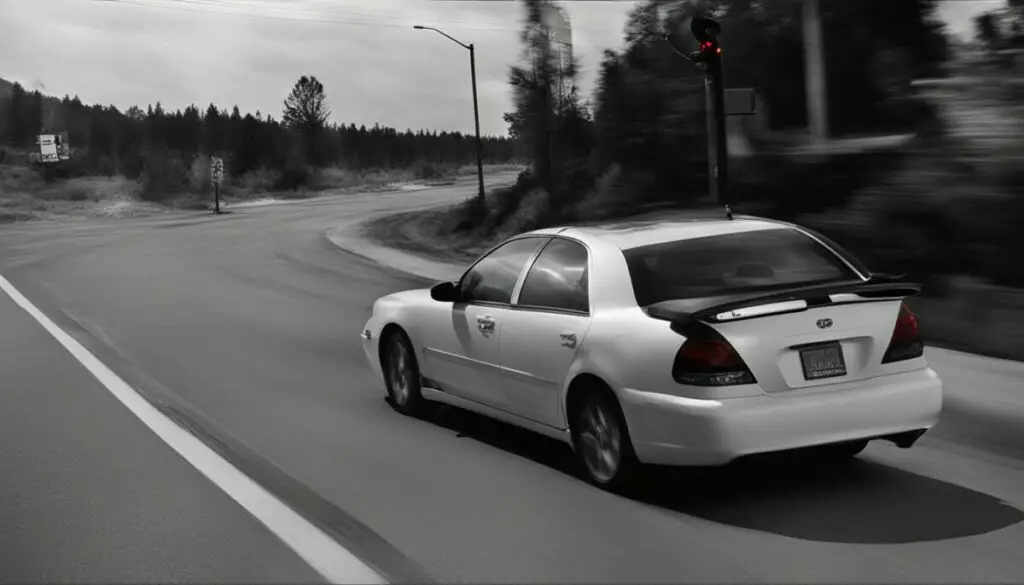
License plate blocking devices, such as jammers or flash-back systems, are widely available on the market. These devices claim to prevent license plates from being read or photographed, offering a sense of privacy to vehicle owners. However, it’s important to note that the legality of these devices is questionable and may vary by state.
While license plate blocking devices may seem like a convenient solution, their use can potentially lead to legal issues. Not all states allow the use of these devices, and using them in states where they are prohibited can result in penalties and fines.
Furthermore, the reliability of license plate blocking devices is also a concern. They may not always effectively block license plate recognition systems, leaving vehicle owners vulnerable to potential violations.
To avoid legal complications, it is crucial to thoroughly understand and comply with the laws and regulations in your specific state before considering the use of any license plate blocking devices. Research and familiarize yourself with the legal restrictions in place to ensure you are making informed decisions and staying within the bounds of the law.
It is always recommended to consult with legal professionals or local authorities to determine the specific rules and regulations regarding license plate blocking devices in your state.
Alternatives to License Plate Blocking Devices
If you are concerned about privacy and wish to protect your license plate from recognition systems, there are alternative solutions available that comply with legal requirements. One such option is Veil Stealth Coating, an infrared-absorbing coating that can be applied to license plates and clear license plate covers.
Veil Stealth Coating absorbs the light used by license plate recognition systems, making it more difficult for the systems to accurately read the numbers and letters on the plate. This can help protect your privacy without violating any laws.
It’s important to note that the effectiveness of Veil Stealth Coating may vary depending on the specific automatic license plate recognition (ALPR) system used in your area. Therefore, it is advisable to research and understand the capabilities of ALPR systems before relying on Veil Stealth Coating as a privacy solution.
By choosing legal alternatives like Veil Stealth Coating, you can protect your privacy without running afoul of the law and ensure peace of mind while on the road.
The Role of Veil Stealth Coating
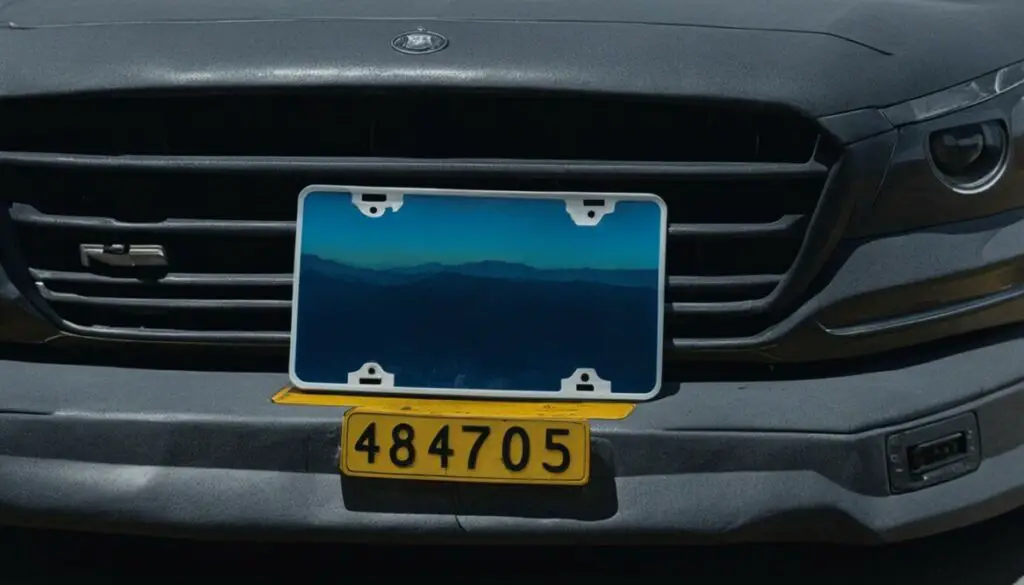
Veil Stealth Coating is an innovative solution for protecting your privacy on the road. This advanced infrared-absorbing coating can be applied to license plates and clear license plate covers, offering effective countermeasures against license plate recognition systems and enhancing your security.
With Veil Stealth Coating, the light used by license plate recognition systems is absorbed, making it more challenging for these systems to accurately read the numbers and letters on the plate. By reducing the visibility of your license plate, Veil Stealth Coating helps protect your privacy against infrared license plate scanners.
But the benefits of Veil Stealth Coating don’t stop there. It also provides protection against police laser traffic speed enforcement. By absorbing and scattering laser beams, Veil Stealth Coating can help prevent accurate speed measurements, giving you an added layer of defense against speeding tickets.
It’s essential to note that the effectiveness of Veil Stealth Coating may vary depending on the specific automatic license plate recognition (ALPR) system used in your area. However, the overall privacy and security advantages of Veil Stealth Coating make it a worthwhile investment for those concerned about their personal information and driving habits being captured by ALPR technology.
With Veil Stealth Coating, protect your privacy and enjoy peace of mind while driving. Shield yourself from the invasive eyes of license plate recognition systems and gain an advantage against police laser traffic speed enforcement. Consider integrating Veil Stealth Coating into your vehicle’s protection strategy and take control of your privacy on the road.
The ACLU and Privacy Concerns
The American Civil Liberties Union (ACLU) has been actively monitoring and raising concerns about the invasion of privacy caused by ALPR technology. They are working to address the legal challenges associated with the use of ALPR systems and the potential violations of privacy rights. While legal challenges take time to work their way through the courts, it is important to stay informed about any developments regarding the legality and use of ALPR technology.
Conclusion
The legality of infrared license plate blockers varies by state. While some states allow their use, others prohibit them. To avoid any legal consequences, it is crucial to understand and comply with the specific license plate cover regulations in your state. Additionally, considering alternative countermeasures such as specialty license plates or Veil Stealth Coating can help protect privacy while staying within the bounds of the law. It’s important to stay informed about privacy rights and legal challenges associated with automatic license plate recognition (ALPR) technology to make informed decisions about protecting your privacy on the road.
| State | Legality of Infrared License Plate Blockers |
|---|---|
| Alabama | Legal |
| Alaska | Legal |
| Arizona | Legal |
| Arkansas | Legal |
| California | Legal |
| Colorado | Prohibited |
| Connecticut | Prohibited |
| Delaware | Prohibited |
| District of Columbia | Prohibited |
| Florida | Prohibited |
Additional Resources and Related Articles
If you’re interested in learning more about license plate privacy, automatic license plate recognition (ALPR), and related topics, here are some additional resources and articles that you may find useful:
1. Privacy Rights Clearinghouse – License Plate Scanners and Vigilant Systems: This resource provides an overview of license plate scanners and the privacy concerns associated with ALPR technology. It explores the impact on individuals’ privacy rights and offers insights into legal challenges and advocacy efforts.
2. Electronic Frontier Foundation – Automated License Plate Readers (ALPR): The Electronic Frontier Foundation (EFF) is actively involved in advocating for privacy rights in the digital age. Their resource on ALPR sheds light on the technology, its implications for privacy, and ongoing legal and policy debates.
3. ACLU – License Plate Readers: The American Civil Liberties Union (ACLU) has been at the forefront of safeguarding privacy rights impacted by ALPR technology. Their resource offers information on the ACLU’s advocacy work, legal challenges, and resources for individuals concerned about license plate privacy.
By delving into these resources, you can deepen your understanding of license plate privacy, stay informed about legal developments, and explore additional perspectives on this important issue.
FAQ
Are infrared license plate blockers legal?
The legality of infrared license plate blockers varies by state. Certain states allow their use, while others prohibit them. It is important to understand and comply with the specific license plate cover regulations in your state.
What are the state laws on license plate visibility?
Each state has specific laws and regulations regarding license plate visibility. These laws vary from state to state, and it is important to familiarize yourself with the regulations in your state. Ensure that your license plate is visible and legible at all times.
What license plate covers and shields are prohibited?
Many states have regulations prohibiting license plate covers and shields that obstruct visibility or diminish the reflective properties of the plate. It is important to avoid using covers or shields that can make the plate difficult to read.
What are the restrictions on red light and speed camera license plate covers?
Several states have specific regulations regarding license plate covers in relation to red light and speed cameras. The use of these covers is prohibited in some states. It is important to understand the restrictions related to these devices to avoid any legal consequences.
How can license plate covers impair license plate reading devices?
Many states have laws that prohibit license plate covers and frames that impair the reading of the plate by devices. It is crucial to ensure that plates are not obstructed in any way that could prevent them from being read by license plate reading devices.
What are the privacy concerns surrounding infrared license plate blockers?
Infrared license plate blockers have raised privacy concerns due to the potential to prevent automatic license plate recognition (ALPR) systems from accurately capturing and recognizing license plates. This technology has led to concerns about the invasion of privacy.
What are the alternatives to infrared license plate blockers?
There are various countermeasures and alternatives to infrared license plate blockers. Some options include using specialty license plates, incorporating brackets that partially obstruct the numbers and letters on the plate, or applying a broad-band infrared-absorbing coating called Veil Stealth Coating.
What is the legality of license plate blocking devices?
The legality of license plate blocking devices is questionable. While these devices may claim to prevent license plates from being read or photographed, they may not comply with legal restrictions in all states. It is crucial to understand and comply with the laws and regulations in your state before using any license plate blocking devices.
What is the role of Veil Stealth Coating?
Veil Stealth Coating is a countermeasure that can be applied to license plates and clear license plate covers. It absorbs the light used by license plate recognition systems, making it more difficult for the systems to accurately read the numbers and letters on the plate. It also offers protection against police laser traffic speed enforcement.
What is the ACLU’s stance on privacy concerns?
The American Civil Liberties Union (ACLU) has been monitoring and raising concerns about the invasion of privacy caused by ALPR technology. They are actively working to address the legal challenges associated with the use of ALPR systems and potential violations of privacy rights.
What is the conclusion on the legality of infrared license plate blockers?
The legality of infrared license plate blockers varies by state. It is important to understand and comply with the specific license plate cover regulations in your state to avoid any legal consequences. Be sure to stay informed about privacy rights and legal challenges associated with ALPR technology.
For more information on license plate privacy, automatic license plate recognition, and related topics, you can explore the following resources and articles.

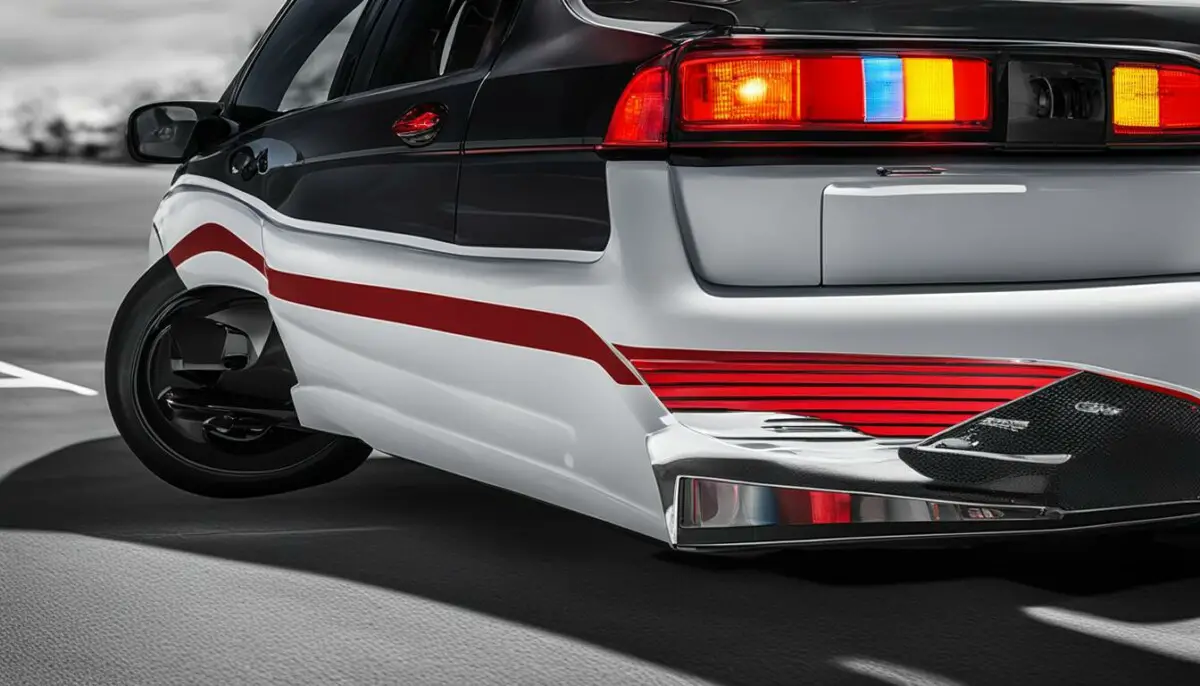

.jpg)
.jpg)
